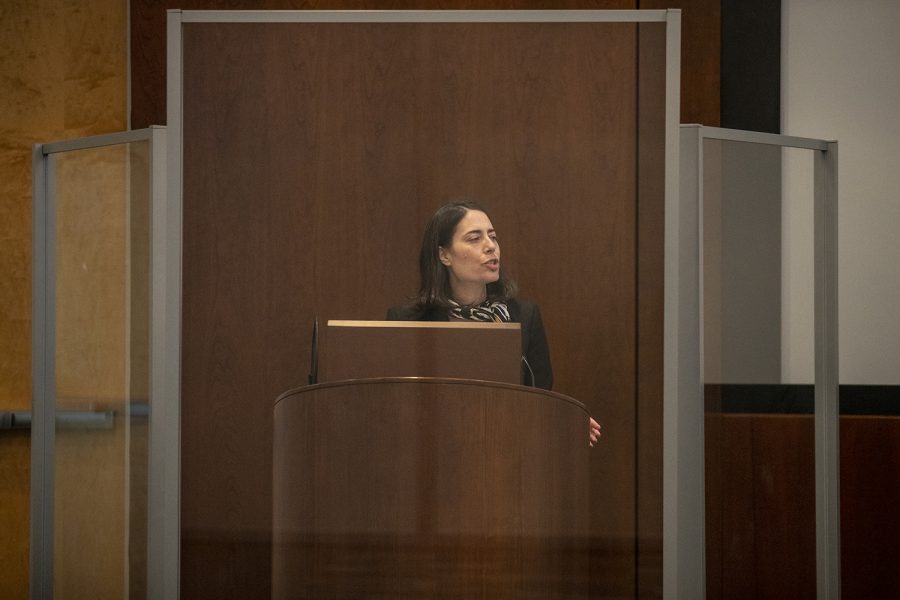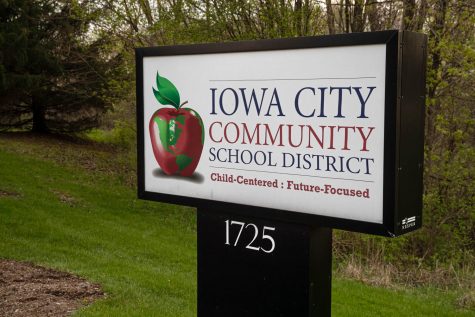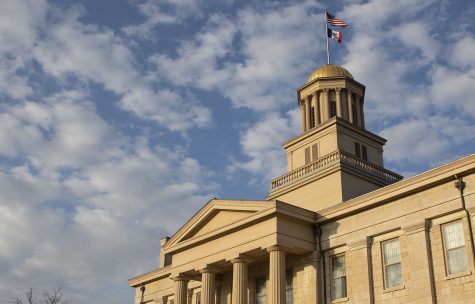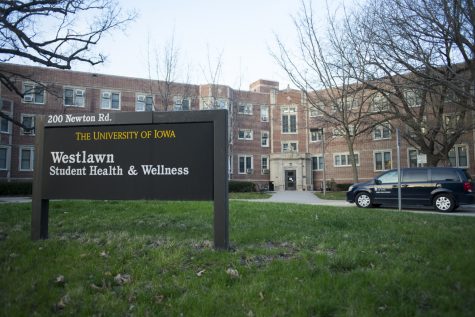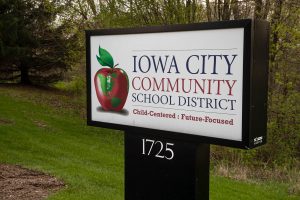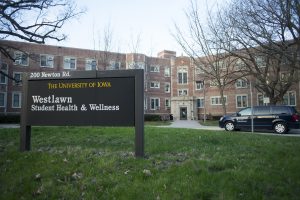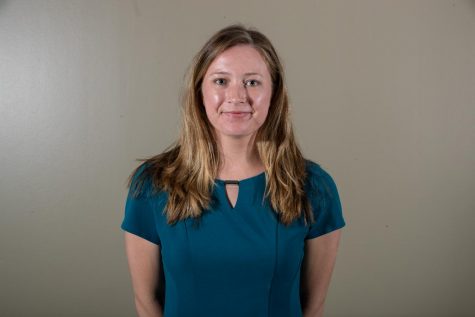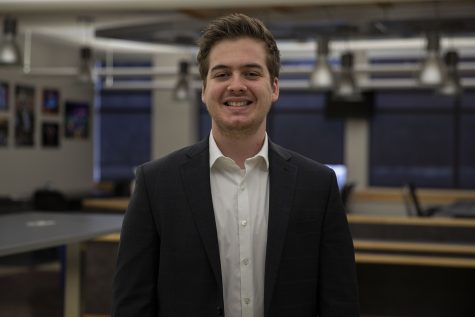First UI presidential forum: Penn State College of Law Dean Hari Osofsky emphasizes collaboration, integrity in leadership
In a public forum on Monday, Dean of Penn State Law Hari Osofsky cited her leadership action in diversity, equity, and inclusion at Penn State as an example of how she would collaborate to improve graduation rates and address pandemic challenges as president.
University of Iowa Presidential Candidate Hari Osofsky gives opening remarks at a public forum, Monday, April 10, 2021, in Iowa City, Iowa. Osofsky currently serves as dean of Penn State’s Law and the Penn State School of International Affairs.
April 12, 2021
As president of the University of Iowa, first finalist Hari Osofsky said she would be a collaborative leader who values “personal integrity” above all else.
The first of four finalists, Osofsky is the dean of the Penn State College of Law and the Penn State School of International Affairs. She has roughly two decades of academic experience, and assumed the dean positions at Penn State in 2017.
As president, Osofsky said she would place a heavy emphasis on collaboration — turning listening sessions into action, improving student graduation rates, pushing diversity, equity, and inclusion efforts, and building relationships across political and university stakeholders, she told a group of about 40 community members and an online audience at the first presidential forum on Monday.
“It’s really important for me to do things in an inclusive and collaborative way,” Osofsky said in answering a question about her values as a leader. “To use shared governance and involve people in decisions in all sorts of different ways but there are moments in leadership where you have to make hard decisions, and you know sometimes that when you do decisions that are the right things to do, that people will be upset with you. And I think you have to have that sense of moral courage and moral integrity as a leader in those moments to do the right thing. So, I think that’s what’s most important.”
The UI and state Board of Regents allowed 40 members of the public into the forum on a first-come, first-serve basis. Eight tickets were available for each of five groups: undergraduate students, graduate and professional students, faculty, staff, and community members.
Not all ticketed seats were filled at the first forum – UI Assistant Vice President for External Relations Jeneane Beck wrote in an email to The Daily Iowan that there looked to be three empty seats.
Each of the three other candidates for next leader of the UI will be announced at 8 a.m. the day before the first day of their visit. The next candidate will be announced Wednesday at 8 a.m.
Campus has until April 27 to submit feedback via an online form.
Diversity, equity, and inclusion; graduation and retention gaps
In many answers, Osofsky reiterated her experience handling pushing for equity in her values and positions.
At the UI, 72 percent of students graduate in six years, according to a 2021 regents report. In 2020, the UI was near the bottom of its peer group in 2020 — a collection of universities comparable to the UI.
That percentage is lower for underrepresented groups and Pell Grant recipients, Osofsky acknowledged during the forum, and addressing the gap would be one of four key priorities in her presidency.
“I’ve seen firsthand the transformational power of education and the importance of pipelines, degree completion, launching students into careers, and providing opportunities for lifetime learning,” Osofsky said to the group.
As president, Osofsky said she would look to partner with campus entities to intervene to support non-completing students. Those could include scholarships or financial support and bolstering mentoring and advising that “maintains connection and mental health support.”
She added that she would hold listening sessions with campus groups and other stakeholders in an effort to bridge where the university is at and how to improve in diversity, equity, and inclusion.
One audience member (questions were asked anonymously by the search co-chairs) asked what other solutions Osofsky had other than listening sessions to improve the environment at the university, as recounting experiences with racism can be taxing for people of color.
Osofsky cited specific examples from her position as the college of law dean this summer after the killing of George Floyd as examples of times when she turned a listening session into concrete action steps.
She set in motion the process to select an associate dean for diversity, equity, and inclusion in the college and established a George Floyd Memorial Scholarship which she and the associate dean for academic affairs provided the initial funds for.
“I think that listening and statements with no action is harmful, but I think that action without listening is equally harmful,” she said.
Stephanie Gilbertson-White, an associate professor and director of the UI’s nursing Ph.D. program, said she appreciated Osofsky providing examples of the work she has done to drive anti-racist efforts on campus.
“I thought she was extremely dynamic and very thoughtful about some of the most pressing issues that we’re facing at the university,” Gilbertson-White said. “I was particularly impressed by the very concrete examples she gave about the work she did last summer after George Floyd’s murder. I appreciated that she had not just talk, but actual examples of real effort.”
Osofsky said her commitment to anti-racism may be seen as political, but there are ways to prioritize diversity and anti-racism while acknowledging freedom of speech, a conflict raised by Iowa Republican legislators in recent months.
Iowa House and Senate Republicans passed bills in March to ban “divisive concepts” from being included in diversity, equity, and inclusion training in schools and universities. The UI paused all diversity training following an executive order with similar wording from former President Donald Trump last fall.
“I think it’s important that we speak out in support of anti-racism values, and obviously I’m now treading into complex political ground by saying that,” Osofsky said. “I think that there are ways we can acknowledge, support, and recognize freedom of speech and diversity of viewpoints, and say we value diversity, equity, and inclusion.”
In an initial budget proposal in the House of Representatives last week, the public universities in Iowa would receive no increase in appropriations, falling far short of the regents’ nearly $30 million request. It reflects a trend of disinvestment in higher education over the course of the last few decades.
Osofsky said one of the top three issues facing the UI will be bridging a divide of political differences.
Osofsky said she could build relationships across political divisions, and that for the UI “strong relationships across the state with leaders of both political parties are crucial.”
“You know, I worry a lot that people have stopped talking to each other who disagree with each other — people unfriend each other on Facebook,” Osofsky said. “I think it’s going to be really important for this university as a public university in this state, the flagship public university, to really work across the state and within its community around these issues of difference.”
Unlike Osofsky, UI senior Eva Sileo said she does not believe anti-racism could be interpreted politically, and expressed mixed views on Osofsky’s dialogue surrounding diversity, equity, and inclusion initiatives.
“She’s obviously very accomplished. I’m excited that we’re considering hiring someone with any background in academics, unlike like last time,” Sileo said. “I will say, it does rub me a little bit the wrong way that she continued to present the political differences of this era as kind of frivolous — like people unfriending each other on Facebook — rather than addressing that there’s a group of people that are violently white supremacist, and then a group of people that are opposed to that. For all her talking about being an ally, I think that would have been a better position to take as opposed to like trying to walk this moderate line that doesn’t really address, like, Nazism resurfacing in America.”
Current UI President Bruce Harreld did not have any academic administrative experience at the time he was selected to be the next UI president. Harreld, a business executive, was the least popular candidate among faculty and staff at the time, and his selection by the regents in 2015 led to now-lifted sanctions on the UI by American Association of University Professors.
Harreld’s end date is May 16, and an interim president — co-chair of the UI presidential search committee John Keller — will fill in the gap until the next president begins.
Open searches
In talking about diversity, Osofsky said open and competitive searches are a way to achieve a more diverse and culturally competent cabinet and staff.
A number of top administrators at the UI — including Executive Vice President and Provost Kevin Kregel and Executive Officer for Diversity, Equity, and Inclusion Liz Tovar — have been appointed from interim positions this year without a formal search process.
Osofsky said women and people of color are sometimes overlooked when internal hires are made without a search process, and she almost didn’t apply for dean jobs because she had not been selected as associate dean through closed searches.
“One of the reasons I do open searches around my associate dean jobs, for example, is because I want to make sure that people who want that opportunity have it,” she said.
Post pandemic
Osofsky is a professor of law, international affairs, and geography at Penn State. According to Penn State Law’s website, Osofsky’s core scholarship includes writings on climate change and energy law.
Assistant Vice President of Health Sciences at the UI Center for Advancement Robert King said he was impressed by Osofsky’s extensive background.
“I like that she has a background as an attorney. She has a diversity of experience and diversity of education, too,” King said. “She has a law background, and has a Ph.D. in geography from different institutions. She brings a different perspective and has a really, really great attitude presence.
Osofsky said she planned to build on the university’s sustainability efforts, including initiatives related to the public/private partnership.
“One of the things that universities can do and the University of Iowa can do is bring together a really wide range of disciplines to think about these problems,” Osofsky said.
Osofsky received both a bachelor’s degree and a J.D. from Yale University, and a doctorate in geography from the University of Oregon. She’s worked in faculty and leadership positions at University of Minnesota Law School, Washington and Lee University School of Law, the University of Oregon school of Law, and Whittier Law School.
Osofsky’s Emory Law Journal article, “Energy Partisanship”, was awarded the 2018 Morrison Prize, which recognizes the most impactful sustainability legal academic article published in North America during the prior year.
After the pandemic, Osofsky said she wanted to incorporate more flexible online options that benefited students and faculty learning. The UI is preparing for a primarily in-person residential campus next fall, and UI leaders have highlighted the campus experience as a strength of the UI.
Osofsky said during the forum that residential experience is crucial, but flexible learning options also offer flexibility that prospective students and professors are looking for.
“How do we incorporate innovative pedagogy remote learning and flexible learning options, emerging technology like immersive learning, expanding online education potentially and flexible learning, and encouraging entrepreneurial innovation in our educational programs can also be important revenue sources for this university moving forward,” she said.
The UI lost about $83.4 million from the pandemic after rounds of federal funding, refunds to students, and costs of COVID-19 mitigation — a financial strain that many public universities are facing across the country.
Osofsky said the UI’s budget model, in which each unit is responsible for its own revenue and expenses, shouldn’t pose a barrier to collaboration between units.
Penn State’s model is more centralized, Osofsky said, but the law school’s budget is more akin to the UI’s model, meaning she has experience in both budget styles.
“It might be that it’s a matter of having conversations where the units figure out where their priorities align, and things that they want to advance together because they make sense for each unit individually as well,” she said.
Throughout her forum, Osofsky pledged to support innovative solutions to higher education’s budget woes. In one example, she said offering flexible learning options could be a potential attraction — not deterrent — for students to learn.
“The reality is that after this pandemic people are going to demand a different kind of flexibility around their education,” Osofsky said. “And the universities that are willing to be responsive to that demand are going to be the universities that thrive.”
Osofsky told those watching she could steer the UI into a new era post-pandemic as higher education faces challenges from all sides.
“I think we have a (chance) in this moment right now to make a difference in how universities evolve and innovate and impact society,” Osofsky said. “This past year has only accelerated those transitions and exacerbated inequality, and our political differences too often stand in the way of constructive solutions. I’m excited by the opportunity that we have at the University of Iowa to advance education for a changing society.”



